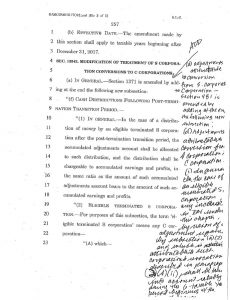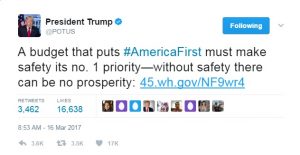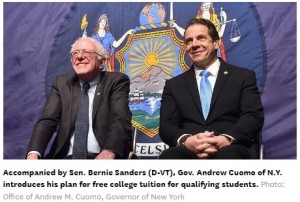Last spring, I wrote about Senator Elizabeth Warren’s college financing proposal for the San Francisco Chronicle. This week, I analyzed for The Conversation former Vice President Joe Biden’s recent proposal to double the maximum Pell Grant as a way of increasing college affordability. The two have taken very different approaches, and assuming they both stay in the race as viable candidates for the Democratic nomination, it will be interesting to see the attention each proposal receives.
Politics
Senator Warren’s college financing proposals
The 2020 campaign for president is already heating up, and the Democratic field includes almost two dozen candidates. One of them, Senator Elizabeth Warren of Massachusetts, recently unleashed a widely-covered proposal offering “free college” and elimination of student debt for millions of Americans. In an op-ed in the San Francisco Chronicle, I analyzed why Warren’s proposal is not in the best interests of the nation.
On Charlottesville, and Squirrel Hill, and . . .

As so often happens in the digital age, the news came first via an alert on my cell phone. “Shooting at Pittsburgh synagogue, fatalities reported.” I was in Connecticut that Saturday morning, sitting in a hotel room with my wife, getting ready to celebrate my mother’s 97th birthday with my family. The name Tree of Life Synagogue sounded familiar, so I asked my wife if she remembered if that was the synagogue where we had attended the Bat Mitzvahs of the daughters of very close friends of ours some years earlier.
Continue reading “On Charlottesville, and Squirrel Hill, and . . .”
Public support for higher education is in trouble again (part 1)
This week the Pew Research Center issued a report on the public’s view of higher education in the United States, and the news is not good. The Pew report builds on a similar survey conducted last year, which also found a lack of support for the nation’s colleges and universities.
Continue reading “Public support for higher education is in trouble again (part 1)”
More on the Sandusky and Nassar scandals
Tax reform that harms graduate students and university employees
The competing House and Senate tax reform bills are large, complex, and often difficult to understand. The Senate bill, for example, is a 479-page document that was passed early in the morning last Saturday and that included last-minute, hand-written passages as shown to the right.  There are numerous parts of each bill that have a large impact on colleges and universities in the country, as well as their students. One estimate calculated after the House bill was passed is that if enacted into law, it would cost students and their families $71 billion over the next ten years. Now that both chambers have passed bills, a conference committee will try to hash out the differences and agree on one bill to be passed by both the House and Senate and sent on to President Trump to be signed into law. Continue reading “Tax reform that harms graduate students and university employees”
There are numerous parts of each bill that have a large impact on colleges and universities in the country, as well as their students. One estimate calculated after the House bill was passed is that if enacted into law, it would cost students and their families $71 billion over the next ten years. Now that both chambers have passed bills, a conference committee will try to hash out the differences and agree on one bill to be passed by both the House and Senate and sent on to President Trump to be signed into law. Continue reading “Tax reform that harms graduate students and university employees”
Why DACA matters to USF and the nation

Earlier this week, under the direction of President Donald Trump, Attorney General Jeff Sessions announced the elimination of the Deferred Action for Childhood Arrivals, or DACA, program. Under his order the approximately 800,000 registered DACA individuals will see their legalized status in this country end in six months, subjecting them to deportation and other administrative actions. The president encouraged Congress to pass legislation that would provide a permanent legalization of the status of DACA registrants, but only if it did so as part of a comprehensive immigration reform plan – something Congress, whether controlled by Democrats or Republicans, has been unable to do for decades.
President Trump’s first budget guts (sic) funding for higher education
President Donald Trump has submitted his first budget to Congress, an event many have been waiting for anxiously.  Candidate Trump, during the presidential campaign last fall, spoke frequently about reducing the size of the federal government and “draining the swamp” of Washington, so this budget was among his first emphatic statements in support of those pledges.
Candidate Trump, during the presidential campaign last fall, spoke frequently about reducing the size of the federal government and “draining the swamp” of Washington, so this budget was among his first emphatic statements in support of those pledges.
There is a lot to discuss about this FY18 budget, including the fact that virtually every Cabinet and other agency included in the budget – with the exception of Defense, Homeland Security, and Veterans Affairs – is seeing a decrease in funding from FY17 levels ranging from 1 percent (NASA) to 31 percent (EPA). There are my details still missing, however, as this is known as a “skinny budget,” typical of that submitted by first-term presidents who do not have much time to put the budget together. My particular and admittedly selfish interest is how this budget is likely to affect the nation’s roughly 4,600 degree-granting institutions of higher education. Here’s the spoiler, for those who don’t want to bother reading this entire post: The news is not good.
Continue reading “President Trump’s first budget guts (sic) funding for higher education”
Higher education turmoil in Washington
It’s been almost seven weeks since President Trump was inaugurated, and it’s been quite tumultuous for those of us in colleges and universities around the country. Regardless of one’s politics, I think that many of us were not sure what to expect with the new administration, largely because then-candidate Donald Trump said relatively little about higher education during the campaign.

I wrote about the little he had said about the topic, and wrote a similar piece about Hillary Clinton’s proposals, which were more fleshed out. I also had written about the President-elect’s nomination of Betsy DeVos to the post of Secretary of Education.
New York Governor Cuomo’s proposal for free college – still a bad idea
Earlier this week, New York Governor Andrew Cuomo joined other politicians who have proposed free college programs. As I have pointed out about similar proposals made by President Obama and former presidential candidate Hillary Clinton, there are numerous problems with these programs. In a commentary in The Hechinger Report, I outline why this is still bad public policy.
presidential candidate Hillary Clinton, there are numerous problems with these programs. In a commentary in The Hechinger Report, I outline why this is still bad public policy.